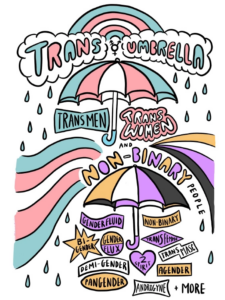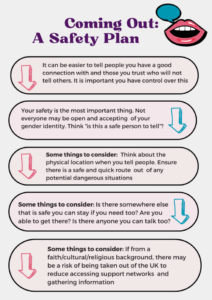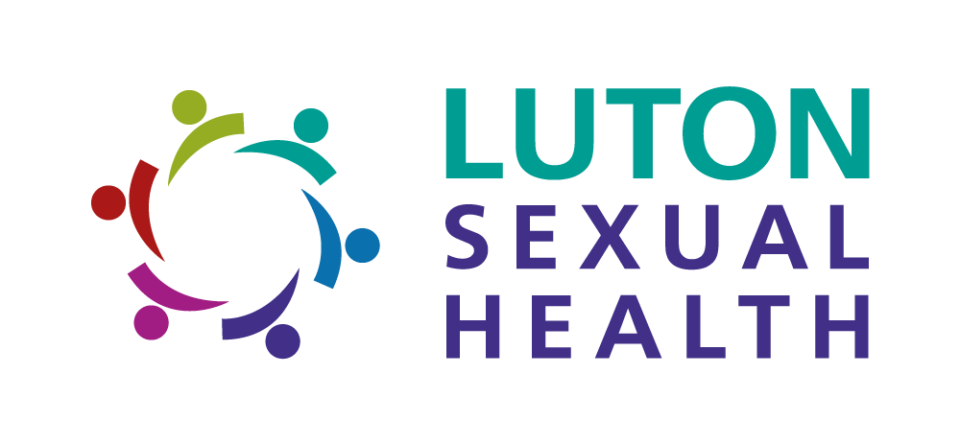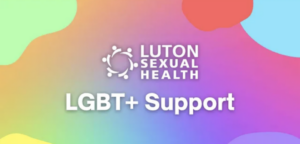LGBT+
In light of the recent UK Supreme Court ruling on the definition of a “woman” under equality legislation, we want to affirm our unwavering commitment to supporting people of all genders.
True inclusion means that we all stand together, at Luton Sexual Health we remain committed to creating a space where everyone can bring their authentic selves and access the care they need.
For further support you can contact our LGBT+ Lead, Drew, on 07976406912 or at Andrew.trowbridge@nhs.net, who will support and signpost if needed.
Welcome to our LGBT+ Support Page.
Luton Sexual Health is an inclusive and sex positive service. We provide a safe, confidential space where you can discuss your sexuality and/or gender without fear of judgement or discrimination. Our team can support you to make informed choices about your sexual health and wellbeing, healthy relationships and consent or signpost you to other relevant services.
Our Sexual Health Service includes:
- Full STI screening, including HIV, Hepatitis B and C (if at high risk & required)
- HIV treatment, routine follow up and care
- Contraception, including emergency contraception
- Condoms and lube
- Hepatitis A & B vaccinations (through assessment)
- HPV Vaccinations
- Assessment for PEP (Post Exposure Prophylaxis for HIV)
- Assessment for PrEP (Pre Exposure Prophylaxis for HIV)
- Contraception options for Trans and NB people
- Cervical cancer screening for Trans and NB people
- Safer sex support for anyone having sex who use drugs/alcohol/chems
We also support clients who may want to talk about the follow topics:
- Exploring sexual orientation
- Exploring gender identity
- Coming out safely
- Transitioning
- Mental health
- Healthy relationships
- Stigma & discrimination
If you’re LGBT+ and would like to speak to someone, or you’re a professional contacting on behalf of a client, you can call or WhatsApp our LGBT+ Lead, Drew on 07976 406 912 (all calls are confidential). Below you will find some additional information you may find useful.
Sexual Orientation:
Sexual orientation refers to who someone is sexually, romantically or emotionally attracted to. Some people’s sexual orientation can be fluid and they can be attracted to different people at different times during their life. For some people, they may have the same sexual orientation for the whole of their life.
It is normal to explore and experiment with your sexual orientation, more often during puberty with the development of sex hormones. How you feel and identify is up to you.
Most common sexual orientations:
Heterosexual – someone who is sexually, romantically and emotionally attracted to people of the opposite sex
Gay – men who are sexually, romantically and emotionally attracted to other men
Lesbian – women who are sexually, romantically and emotionally attracted to other women
Bisexual – someone who is sexually, romantically and emotionally attracted to more than one gender
Asexual – someone who doesn’t experience sexual feelings or desires or have any attraction to someone
Other recognised sexual identities:
Pansexual – someone who is sexually, romantically and emotionally attracted to people regardless of sex or gender identity
Demisexual – someone who is only attracted to someone after they’ve formed a strong emotional bond with them
GBMSM – Gay, Bisexual, Men who have Sex with Men. This may include men married to women
GBWSW – Gay, Bisexual, Women who have sex with Women. This may include women married to men
Questioning – someone who is exploring their sexual orientation
Gender identity refers to a person’s understanding and experience of their own gender from a psychological and emotional perspective. Everyone has a gender identity which may, or may not, match the sex they were assigned at birth.
Gender can be placed onto a broad spectrum of different/alternative gender identities, other than just traditional male and female. These include identifying as Transgender, Non-Binary, Non-Gendered or Gender-Fluid (non-exhaustive list) and may involve some form of personal/medical/surgical transitioning.
If a person identifies as Transgender, this means that their gender identity does not match or is different from the sex they were assigned at birth. Some people may describe this as feeling they were born into ‘the wrong’ biological body.
A person who identifies as Non-Binary experiences their gender in a variety of different ways. It may include: a combination of male and female elements; be neither male nor female; or mean identifying in an altogether different/original way. They may not want to use words associated with being male/masculine and female/feminine to describe their gender.
A person’s Gender Expression is the way an individual presents their gender. This can include the way the person dresses (which may not be permanent), mannerisms, their name and the pronouns they would like to be addressed by: he/him, she/her, or they/them.

Trans Umbrella by Fox Fisher
Coming out to people as LGBT+ even to close friends and family members, can be a difficult, stressful and anxious experience.
It is important that you tell others about your gender identity/sexual orientation, but only when you feel ready. This allows you to take control of the the situation and to tell people who you feel will be most supportive, non-judgemental and comforting.
On some occasions, you may find it difficult and want help from others to come out. We can help you to think about how you would like to do this and how to do this safely.

LSH Safety Plan – Andrew Trowbridge (LGBT+ Lead)
Discussions around having safer sex are really important, including discussions you may have with your sexual partners. Below are some considerations:
- Regular testing allows us to identify STI’s and allows quicker access to treatment and care.
- Ensure you use the right size condom and know how to use them correctly. Using plenty of lube (water based), will reduce the risk of the condom splitting. Condoms can also be used for oral sex and come in a variety of flavours and sizes
- If you are sharing any sex toys with sexual partners it is advisable to use condoms to reduce STI risks. It is also advisable to clean all sex toys after use
- If you are inserting your finger(s)/fist into someone’s anus, it is advisable to use plenty of lube (water based) and latex gloves to reduce injuring/causing pain to the person you’re having contact with. Gloves will also protect you from any fluids in the partner’s anus (blood, secretions and faeces)
- If you use any drugs/alcohol before or during sex, be mindful of how these can impact on your sexual behaviours – ability to consent, getting/maintaining an erection and ability to negotiate safer sex. If you are engaging in Chem sex, measure your doses carefully and precisely, particularly GHB. If you would like support around this please contact our health advisors on 01582 718959 or our LGBT+ Lead on 07976 406 912.
- Access to PEP (post exposure) and PrEP (pre exposure) to reduce HIV risk and discussions with partners about if they are using PrEP
Vaccinations:
Hepatitis B – vaccinations are available for people at high risk of the infection. This includes male/female sex workers, GBMSM, people who change their partner frequently and people who inject drugs
HPV (Human Papillomavirus) – vaccinations are able free at Luton Sexual Health for GBMSM/Trans women/non-binary people aged 15-45 who are sexually active or thinking about becoming sexually active who identify as GBMSM. The vaccine consists of 3 doses over a period of time.
Social Media Apps:
The increase in dating/hook up apps aimed at LGBT+ people has made it more important to stay informed of sexual health information. Remember to stay safe when meeting new sexual partners that you have only talked to online – let someone know where you are going, avoid eating or drinking anything given to you by casual sex partners, and leave any situation that is making you feel uncomfortable or anxious. If you turn up to meet someone and they do not look like the picture on the app, it’s ok to say no and leave.
There are lots of amazing local and national organisations that can support with sexual orientation and gender identity. If you feel that you need support or would like to talk to someone about how you are feeling, please have a look at the services below and make contact.
Local:
Luton Sexual Health LGBT+ Lead – Drew: 07976 406 912
Tokko – OK2B Group (Under 18) – OK2B – Tokko
Pride in Luton – Pride in Luton
Luton Trans+ Admin – Trans Admin group (prideinluton.org)
LGBT Bedfordshire – LGBT+ | LGBT Bedfordshire, England (lgbtbeds.org)
Rainbow Bedfordshire – Rainbow Bedfordshire Facebook
BLMK Better Days – BLMK Better Days Facebook
Q:alliance – Q:alliance | LGBTQ+ (qalliance.org.uk)
National:
Galop UK (LGBT+ Domestic Violence) – Galop – the LGBT+ anti-abuse charity
Mermaids UK (Gender Identity) – Homepage – Mermaids (mermaidsuk.org.uk)
Stonewall UK – Stonewall
Switchboard LGBT+ – Switchboard LGBT+ Helpline
Age Concern – LGBT+ Support
Childline (Under 18) – 0800 11 11
NHS Screening Programmes
It is also really important to stay aware of other NHS screening programmes that you may require as you get older.
It is important that you discuss your gender identity with your Doctor and that they document this in your medical notes so you do not miss any call ups to access screening opportunities. Screening can include breast, cervical, bowel and prostate cancer screening and AAA (Abnormal aortic aneurysm) screening. Mis-documentation of gender could potentially lead to missed opportunities to screen. Please see below for more details about what screening is important for you along with recommended age range (this could also support you to remind Doctors that you are due screening)
NHS Screening Guidance for trans patients
Some people may experience challenging emotions when thinking about cancer screenings for parts of the body that don’t match their gender or because of negative experiences involving body parts that may need screening. It is important to attend these screening opportunities so it is important to discuss with your GP or care provider how to keep the parts of your body healthy and develop safe plans for screening
Breast screening in the UK is for anyone between the ages of 50 and 70 who has breasts, due to either naturally-occurring oestrogen or oestrogen hormone therapy.
- trans men and non-binary people assigned female at birth who have not had a mastectomy or ”top” surgery*
- trans women and non-binary people assigned male at birth and who have taken feminising hormones
- cisgender women
* If you have had surgery to remove the breasts it is likely that there will still be a small amount of breast tissue remaining. It is not possible to examine this by mammography. If you notice any changes to your nipples, chest or armpits then tell your doctor.
Source: Cancer Research
Cervical screening is a way of preventing cervical cancer. It tests for the human papillomavirus (HPV), which causes almost all cases of cervical cancer. Cervical screening can spot any abnormal cell changes in the cervix so that they can be treated before they have chance to develop into cancer.
Cervical screening in the UK is for anyone with a cervix who is aged 25 to 64. This can include anyone who has not had any procedure to remove the womb or cervix, including :
- trans men
- non-binary people assigned female at birth
- cisgender women
Source: Cancer Research
Everyone in the UK is invited to bowel cancer screening regardless of their gender. If you live in England and Wales, it is offered for people starting from the age of 50-60 up to 74 years. In Northern Ireland its 60-74, and in Scotland its 50-74.
You will receive a screening kit which can be done at home and will be sent every 2 years
If you are a trans woman who has had genital reconstruction surgery (vaginoplasty) using a loop of bowel, make your GP is aware of this when you are eligible for bowel screening.
Source: Cancer Research
Prostate cancer screening is available to all cisgender men and trans women/non-binary people assigned male at birth if you are over 50 years old. Gender affirming surgery does not remove the prostate, so trans women can still develop prostate cancer.
Most experts suggest you should have a PSA test (blood test) before starting feminising hormones or testosterone blockers if you’re aged 50 or over, or over the age of 45 if you have a family history of prostate cancer or if you are black.
Source: Cancer Research
It is recommended that anyone who has testicles should self examine for testicular cancer, especially between the ages of 20 – 44. This includes –
- trans women
- anyone assigned male at birth
- cisgender males
Anyone has had an orchiectomy (removal of both testicles) may not need any screening. Those with one testicle will still require screening.
AAA screening looks for bulges in the aorta, the main blood vessel that supplies blood to the body. The goal is to find AAA early so they can be monitored or treated. People who were assigned male at birth are more likely to suffer from an aneurysm in the Aorta. If you identify as a trans female then you will need to discuss AAA screening with your GP.
For further information about AAA screening, please click on this link – AAA screening
Source: Cancer Research

